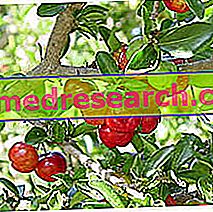
Scientific name
Malpighia glabra L.
Family
Rosaceae
Used Parts
Fruits for food and medicinal use.
Chemical constituents
- Carotenoids
- Flavonoids
- Tannins
- Ascorbic acid
- Vitamins
Property
The acerola is a very useful plant, as it is a rich natural source of vitamin C. Indeed, this plant contains an amount of ascorbic acid 30-50 times higher than that contained in citrus fruits.
Biological activity
The use of the acerola has not obtained the official approval for any type of therapeutic indication. However, it is a plant that is used in numerous dietary supplements thanks to the high amounts of vitamin C it contains.
The acerola is therefore used in all those cases in which an adequate intake of ascorbic acid is necessary, such as, for example, in the case of flu syndromes and colds, or in the case of convalescence, asthenia and vitamin deficiencies.
Furthermore, the plant has strong antioxidant properties, thanks to its high vitamin content.
However, for more detailed information on the uses and characteristics of the acerola, please refer to the article "Acerola - Properties of the acerola and Vitamin C".
Acerola in folk medicine and homeopathy
In folk medicine, the fruits of the acerola are used for the treatment of diarrhea, dysentery and liver disorders. Fruit juice, on the other hand, is used in traditional medicine for the treatment of sore throat; as well as being used as an astringent remedy.
As for homeopathic medicine, on the other hand, at the moment the acerola is not used in this context.
Contraindications
Ascertained hypersensitivity to one or more components.
Pharmacological Interactions
Be careful when using hydroquinone disinfectants because - at high doses - vitamin C (acerola is rich) counteracts the urinary disinfectant activity of Ericaceae (eg. Uva Ursi and Corbezzolo).
Acerola - Properties of Acerola and Vitamin C »



